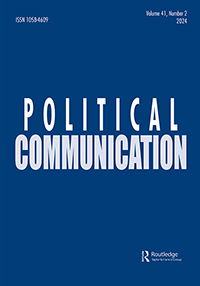重新定义社交媒体上的跨领域政治表达:2016年英国脱欧公投期间脸书评论的案例研究
IF 5.1
1区 社会学
Q1 COMMUNICATION
引用次数: 0
摘要
长期以来,政治传播研究一直试图了解跨领域接触对政治参与的影响。在这里,我们主张一种范式转变,承认公民作为社交媒体上跨领域表达的生产者的代理。我们将交叉表达定义为在反态度空间内通过言语或行为进行的政治交流。在阐述了我们对横切表达的概念之后,我们实证地探讨了:它的范围,它与政治争论的关系,以及它对2016年英国脱欧公投期间的数字竞选活动的影响。我们的数据集包括来自344,884名用户的2,198,741条评论,是根据Facebook对英国脱欧公投期间活跃的三个公共竞选页面的评论构建的:StrongerIn, VoteLeave和LeaveEU。我们利用反应数据将党派划分为“留欧”和“脱欧”阵营,然后绘制用户在三个页面上的评论流图表。我们估计29%的评论是跨领域的,我们发现跨领域的表达与理性的政治论点之间存在很强的相关性。然后,为了更好地理解跨领域表达如何影响社交媒体上的政治参与,我们对数据集进行主题建模,以确定Facebook上英国退欧辩论期间讨论的政治主题。我们的研究结果表明,政治Facebook页面不是回音室,交叉表达与合理的政治论点相关,并且交叉表达可能影响政治Facebook页面的在线选民动员潜力。本文章由计算机程序翻译,如有差异,请以英文原文为准。
Reconceptualizing Cross-Cutting Political Expression on Social Media: A Case Study of Facebook Comments During the 2016 Brexit Referendum
ABSTRACT Political communication research has long sought to understand the effects of cross-cutting exposure on political participation. Here, we argue for a paradigm shift that acknowledges the agency of citizens as producers of cross-cutting expression on social media. We define cross-cutting expression as political communication through speech or behavior within a counter-attitudinal space. After explicating our conceptualization of cross-cutting expression, we empirically explore: its extent, its relationship to political arguments, and its implications for digital campaigning during the 2016 Brexit Referendum. Our dataset, comprising 2,198,741 comments from 344,884 users, is built from Facebook comments to three public campaign pages active during the Brexit referendum: StrongerIn, VoteLeave, and LeaveEU. We utilize reactions data to sort partisans into “Remain” and “Brexit” camps and, thereafter, chart users’ commenting flows across the three pages. We estimate 29% of comments to be cross-cutting, and we find strong correlations between cross-cutting expression and reasoned political arguments. Then, to better understand how cross-cutting expression may influence political participation on social media, we topic model the dataset to identify the political themes discussed during the Brexit debate on Facebook. Our findings suggest that political Facebook pages are not echo chambers, that cross-cutting expression correlates with reasoned political arguments, and that cross-cutting expression may influence the online voter mobilization potential of political Facebook pages.
求助全文
通过发布文献求助,成功后即可免费获取论文全文。
去求助
来源期刊

Political Communication
Multiple-
CiteScore
13.90
自引率
2.70%
发文量
30
期刊介绍:
Political Communication is a quarterly international journal showcasing state-of-the-art, theory-driven empirical research at the nexus of politics and communication. Its broad scope addresses swiftly evolving dynamics and urgent policy considerations globally. The journal embraces diverse research methodologies and analytical perspectives aimed at advancing comprehension of political communication practices, processes, content, effects, and policy implications. Regular symposium issues delve deeply into key thematic areas.
 求助内容:
求助内容: 应助结果提醒方式:
应助结果提醒方式:


